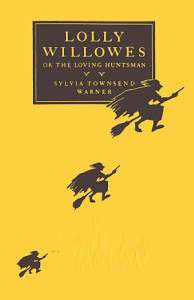Sylvia Townsend Warner
Grosset & Dunlap, 1926
252 pages
Often when I pick a book from my TBR list I wonder how it got there. However this time I can say with certainty that I first heard about "Lolly Willowes" from Scott at the Furrowed Middlebrow book blog. When someone states that this is their favorite novel of all time, someone who shares my taste for novels from the 1920s-1950s and has 2,000+ books in his database, I think it behooves me to read that book!
"Lolly Willowes" was British author Sylvia Townsend Warner's first novel, and it was an immediate success both in England and America. It even became the inaugural selection of the Book of the Month Club in April 1926.
As the story opens, Laura Willowes is moving in with her brother and his family in London after the death of their father in 1902. She is 28 and has lived in their rural family home her whole life, enjoying nature and country life, uninterested in marriage. For the next 20 years she is Aunt Lolly (her niece couldn't pronounce "Laura" properly and it stuck) who helps raise her nieces in London. Then out of nowhere she decides to move by herself to a tiny village called Great Mop, where she is free to be herself, unconstrained by narrow societal norms for single women.
At that point the story takes a turn away from being a nice, conventional tale. Curious events begin to happen: Strange music in the wee hours. Lots of people out walking very late at night. Nothing particularly sinister, just odd things. Laura accepts the villager's easy explanations and happily continues her new life on her own terms.
Then one day her nephew moves to Great Mop and she feels all the old obligations begin to fall on her again. So she makes a pact with Satan and declares herself a witch. The devil in question appears as an older country woodsman, quite civilized, no fire and brimstone. Laura and he have several philosophical chats. Nothing very witch-like happens; she's not like the Wicked Witch of the West from the "Wizard of Oz". She's happy. End of story.
Normally I don't like to give so much away, but I thought that one would need a basic plot outline to understand any comments about the story itself. Don't worry, there's really a lot more to the novel that I haven't touched on here.
After I read the book I wasn't quite sure what to make of it. I enjoyed the story immensely but what was it about? That abrupt turn to the devil was done very calmly. In fact, when she first declares this, I laughed out loud at the absurdity of it! I wondered if she was suffering from delusions or hallucinations. And is she truly free or does she just have a nicer man in charge who leaves her on her own? Looking for some guidance, I found much online analysis of the book, probably due to its reissue by the New York Review Books in 1999 and by Virago Modern Classics in 2012.
In the reviews there are various discussions about a satire of Britain in the 1920s, proto-feminism, under-the-radar lesbian themes, and the "surplus women" problem in England between the wars. To me that was all too vague and theoretical. I simply enjoyed the story of an independent-minded woman who breaks away from society to do her own thing. I did see a suggestion somewhere of a tinge of Magical Realism, and I think that might be an apt way to describe the last section in Great Mop. especially when she's chatting with Satan on a hillside.
Scott's review at Furrowed Middlebrow is one of the best at teasing out possible meanings, some of them contradictory, without imposing any particular Correct Meaning. Of course his whole blog is worthy of your time if you are interested in his specialty: lesser-known British, Irish, & American women writers 1910-1960.
There is a lot to think about in this story, and I can understand why bloggers talk about reading "Lolly Willowes" over and over again, gaining new perspective on it as they grow older. I am going to need to reread it myself to see what I may have missed this time.
Another virtue of the book that I must mention is the lush prose of Townsend Warner! She creates the most extraordinary similes and metaphors. My book has many fluttering flags marking special passages.
Lolly was in a small shop, half florist and half greengrocer, with shelves full of "jars of home-made jam and bottled fruits. It was as though the remnants of summer had come into the little shop for shelter."
When Lolly announces her decision to move to Great Mop, her brother is furious and he argues with her. Then he stops and turns his head away. [Titus is her nephew.] "For some time Titus's attempts at speech had hovered above the tumult, like one holy appeasing dove loosed after the other. The last dove was luckier. It settled on Laura."
Lolly spends an unhappy afternoon sitting in a field and the daylight begins to fade. "The long afternoon was ebbing away, stealthily, impassively, as though it were dying under an anaesthetic."
Thank you Scott for suggesting an excellent novel! I highly recommend it, too. This is my entry for the Back to the Classics 2019 Challenge, in the Classic by a Woman category.
Further Reading
"Hen Wives, Spinsters, and Lolly Willowes"
A very interesting article from the blog Myth & Moor, "a Dartmoor studio on folklore, fairy tales, fantasy, mythic arts & mythic living"
https://www.terriwindling.com/blog/2018/04/sylvia-townsend-warner.html
"Sylvia Townsend Warner: the neglected writer"
An excellent long article by the contemporary writer, Sarah Waters
https://www.theguardian.com/books/2012/mar/02/sylvia-townsend-warner
The Sylvia Townsend Warner Society
http://www.townsendwarner.com/





No comments:
Post a Comment